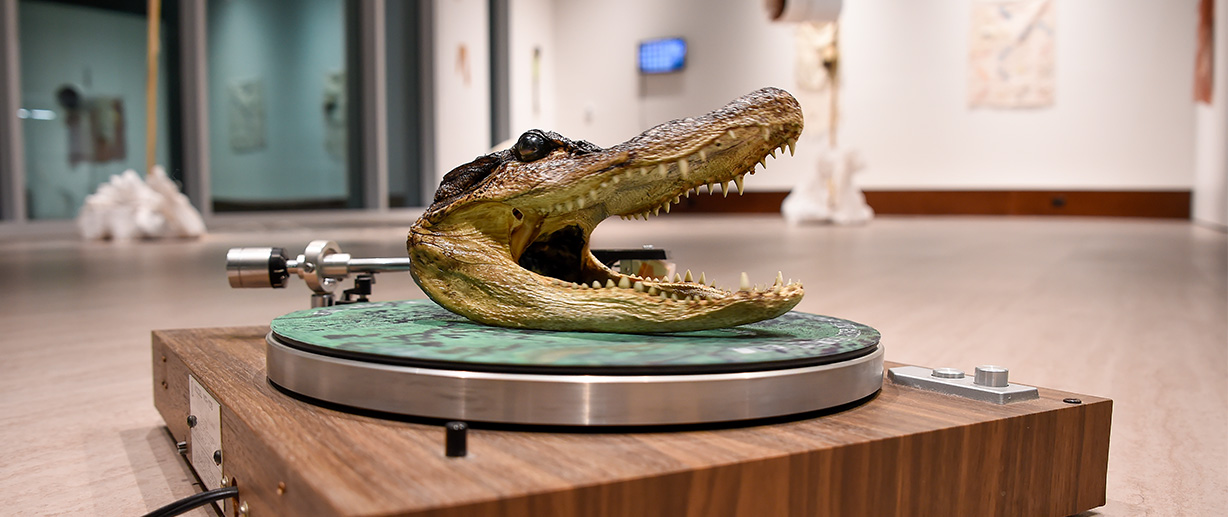While the Wofford community has had to make many adjustments to the ways in which we gather for events during the 2020-21 academic year, the Department of Art and Art History remains committed to offering engaging experiences for our students, faculty and staff, and local communities. From gallery talks to film screenings, this spring offers a full calendar of virtual programming that will allow guests to safely and enjoyably explore the fine arts at Wofford.
Dr. Karen Goodchild, chair of art and art history at Wofford, speaks on the department’s goals for these events: “This year, in our speakers series, we wanted to focus on helping students think about ways to continue working in the arts beyond graduation. In the fall, students had the chance to meet with a conservator to learn about art conservation. This semester, they can join us to talk with Dr. Jill Greenwood, curator of education at the Allen Memorial Art Museum at Oberlin College. We also want the speakers we bring to amplify what students are learning in our classrooms and studios. We are very lucky to be bringing several visiting artists in virtually to speak about their work and careers this semester, often in conjunction with an exhibition on view.”
At 6 p.m. on Feb. 24, artists Rachel de Cuba and matthew batty will speak about their gallery exhibition, “From: Mangroves To: Magnolias – Memories of Landscapes and Lineages of the Ephemeral,” on view in the Richardson Family Art Gallery until Feb. 28. Interdisciplinary artists who work with a variety of artistic media, de Cuba and batty have compiled a collection of work that investigates adaptation and memory within landscapes using found material, digital artifacts, textiles and other media. The exhibition is inspired by the ability of mangroves and magnolias to continually grow in adverse environments, and to thrive in the spaces at the margins as well as existing in areas of immense population growth.
At 4 p.m. on Feb. 25, Dr. Jill Greenwood joins us for an event titled “What Does a Curator of Education Do?” Greenwood is the Eric and Jane Nord Family Curator of Education at the Allen Memorial Art Museum at Oberlin College and has over 17 years of non-profit and curatorial experience from her work at the Portland Art Museum, the Spencer Museum of Art, the Hallie Ford Museum of Art and the Arts Council of Lake Oswego. She is currently responsible for public programming and tours at the Allen Memorial Art Museum and at the Weltzheimer/Johnson House designed by Frank Lloyd Wright. She also teaches the winter term practicum in museum education for the museum’s docent training program. Greenwood has taught art history and museum studies courses at multiple institutions in the U.S., as well as in Paris, Florence, and Brussels.
Throughout March, guests may attend a series of virtual events centered on experimental and documentary filmmaking, beginning with a screening of “Checkerboard Borders: Experimental Films of the Global South,” which will run from March 8-19. The screening foregrounds contemporary filmmakers and films that are not widely distributed, are experimental or avant-garde, and take a unique visual and narrative approach to questions of memory, homecoming, and displacement. The film is a collaboration with Sarah Lasley (University of Texas at San Antonio) and Dr. Nadia Yaqub (University of North Carolina at Chapel Hill). This asynchronous screening will be available via special link for the duration of the two weeks. A panel with the filmmakers will take place on March 15, and Dr. Yaqub will speak about her experience curating and studying Palestinian cinema and experimental film and filmmakers on March 22.
Finally, at 7 p.m. on March 26, Coriana Close joins us for an artist’s talk. Close is an associate professor of photography at The University of Memphis who works both in still photography and in appropriated layered video. Her work focuses on social justice, state-sanctioned violence, and the relationship between human beings and the natural world. Her projects often document forgotten historical landscapes, such as underground railroad sites in Ohio and abandoned cemeteries in Tennessee. Her most recent project, “Cuba Landing Food Forest,” marks a shift toward creating alternative non-violent environmental options.
For updates on our programming and links to these virtual events, follow the Rosalind Sallenger Richardson Center for the Arts on Facebook and Instagram (@wocoartscenter). Event links may also be found on Wofford’s campus calendar and in the daily announcements. Visit www.wofford.edu/student-experiences/arts-culture for more information on our exhibitions, collections, and events.
